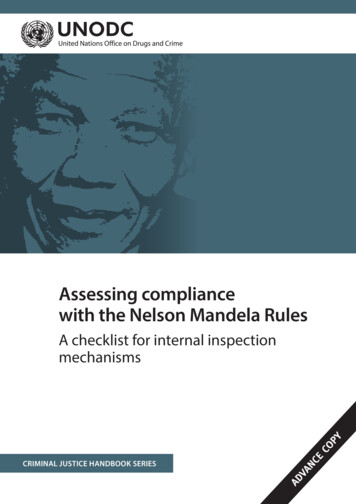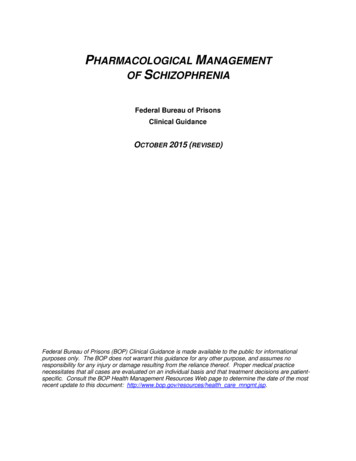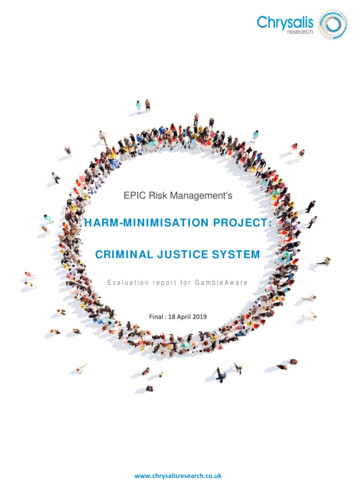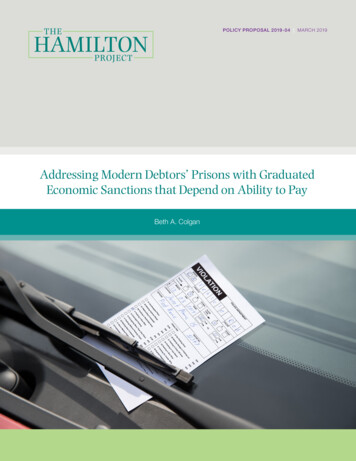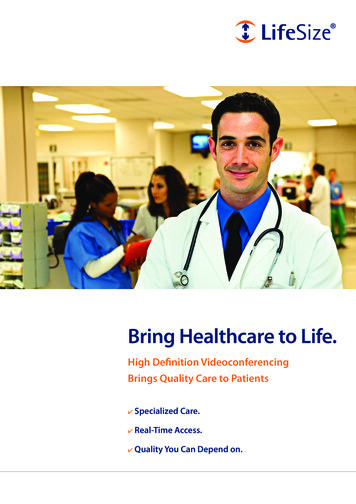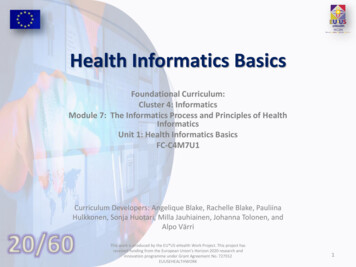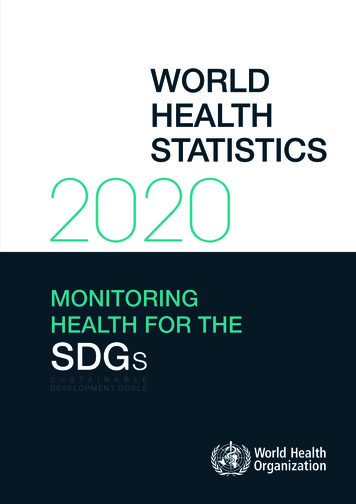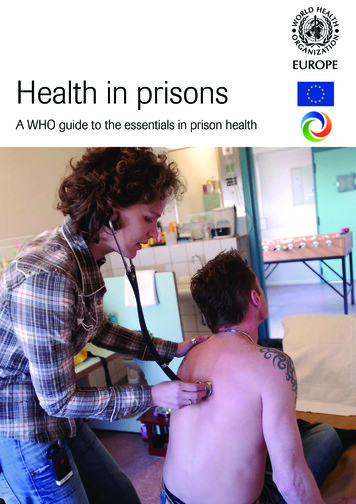
Transcription
Health in prisonsA WHO guide to the essentials in prison health
Health in prisonsA WHO guide to the essentials in prison healthEdited by: Lars Møller, Heino Stöver,Ralf Jürgens, Alex Gatherer and Haik Nikogosian
Promoting health in prisonsThe essentialsAbstractBased on the experience of many countries in Europe and the advice of experts, thisguide outlines some of the steps prison systems should take to reduce the publichealth risks from compulsory detention in often unhealthy situations, to care forprisoners in need and to promote the health of prisoners and staff. This especiallyrequires that everyone working in prisons understand well how imprisonment affectshealth and the health needs of prisoners and that evidence-based prison healthservices can be provided for everyone needing treatment, care and prevention inprison. Other essential elements are being aware of and accepting internationallyrecommended standards for prison health; providing professional care with the sameadherence to professional ethics as in other health services; and, while seeing individual needs as the central feature of the care provided, promoting a whole-prisonapproach to the care and promoting the health and well-being of those in custody.KeywordsHEALTH PROMOTION – organization and administrationHEALTH SERVICES – standardsPRIMARY HEALTH CARE – standardsPRISONSPRISONERSQUALITY OF HEALTH CAREHEALTH PLANNING GUIDELINESEUROPEEUR/07/5063925ISBN 978 92 890 78209Address requests about publications of the WHO Regional Office for Europe to:PublicationsWHO Regional Office for EuropeScherfigsvej 8DK-2100 Copenhagen Ø, DenmarkAlternatively, complete an online request form for documentation, health information, or for permission to quote or translate, on the Regional Office web site(http://www.euro.who.int/pubrequest). World Health Organization 2007All rights reserved. The Regional Office for Europe of the World Health Organization welcomes requests for permission toreproduce or translate its publications, in part or in full.The designations employed and the presentation of the material in this publication do not imply the expression of any opinion whatsoever on the part of the World Health Organization concerning the legal status of any country, territory, city or areaor of its authorities, or concerning the delimitation of its frontiers or boundaries. Where the designation “country or area”appears in the headings of tables, it covers countries, territories, cities, or areas. Dotted lines on maps represent approximateborder lines for which there may not yet be full agreement.The mention of specific companies or of certain manufacturers’ products does not imply that they are endorsed or recommended by the World Health Organization in preference to others of a similar nature that are not mentioned. Errors andomissions excepted, the names of proprietary products are distinguished by initial capital letters.The World Health Organization does not warrant that the information contained in this publication is complete and correctand shall not be liable for any damages incurred as a result of its use. The views expressed by authors or editors do not necessarily represent the decisions or the stated policy of the World Health Organization.
Promoting health in prisonsThe essentialsContentsForeword viiPreface viiiContributors xDefinitions xvi1.Introduction 1Who this guide is for 1How to use this guide 1The essentials and important first steps 1Political leadership 2Management leadership 3Leadership by each member of the staff 4The special leadership role of health personnel 4Partnerships for health: (1) the role of prisoners 5Partnerships for health: (2) community support 5References 52.Standards in prison health: the prisoner as a patient - Andrew Coyle 7The basic principles 7The relationship between the prisoner and health care staff 8The organization of prison health care 9European Prison Rules 11Conclusion 12References 12Further reading 133.Protecting and promoting health in prisons: a settings approach - Paul Hayton 15Introduction 15Major problems that need to be addressed 15The whole-prison or settings approach and a vision for a health-promoting prison 17References 20Further reading 204.Primary health care in prisons - Andrew Fraser 21Introduction 21The components of primary care 24The journey of primary care 24Prison health care resources 25Common problems encountered in primary care practice in prisons 26Building blocks for primary care in prison 26Measuring performance in health care 27Conclusion 30References 31Further reading 315.Prison-specific ethical and clinical problems - Jean-Pierre Restellini 33Introduction 33Health care staff in prison 34Disciplinary measures 35Physical restraint 36Intimate body searches 36iii
Promoting health in prisonsThe essentialsPrisoners who stop eating or go on hunger strikes 37Torture and inhumane or degrading treatment 40Conclusions 41Reference 41Further reading 416.Communicable diseases - Dumitru Laticevschi 43Introduction 43Bloodborne diseases 45Tuberculosis 47Sexually transmitted infections 50Skin conditions 56Infectious diseases of the digestive tract 57Reference 58Further reading 597.HIV infection and human rights in prisons - Rick Lines 61Setting the context: HIV-related stigma and discrimination in prisons 61Confidentiality in prison 62HIV testing and pretest and post-test counselling 64 Coercive approaches are counterproductive 65Addressing concerns about trust and confidentiality: working with nongovernmental organizations,people living with HIV, peers and professionals outside the prison system 68Compassionate or early release 69Conclusion 69References 70Further reading 708.Tuberculosis control in prisons - Jaap Veen 73Introduction 73What is tuberculosis? 74What can be done to reduce the risk of transmission of tuberculosis? 76How to manage tuberculosis cases 79Treatment 79How should tuberculosis services in the penitentiary system be organized? 80Conclusion 82References 82Further reading 839.Drug use and drug services in prisons - Heino Stöver and Caren Weilandt 85Drug use and the consequences for prisoners, prisons and prison health care 85Definition of a drug user 87Nature and prevalence of drug use and related risks in prisons 88Prevention, treatment, harm reduction and aftercare 90Organization and practice of health care, treatment and assistance 91Assessment of drug problems and related infectious diseases 94Preventing drug use 95Detoxification 95Drug-free units 97Contract treatment units and drug-free units 97Abstinence-oriented treatment and therapeutic communities in prison 98Substitution treatment 99Counselling and peer support 100Harm reduction programmes 101Involvement of community services 105Vocational training 109References 109Further reading 11110.Substitution treatment in prisons - Andrej Kastelic 113Introduction 113What is substitution treatment? 114The main goals of substitution treatment 115Evidence of the benefits of substitution treatment 116Effective treatment 120iv
Promoting health in prisonsThe essentialsCriteria for treatment and treatment plan 121Risks and limitations 122Substitution agents 122Some basic information about treatment 126The link with treatment for HIV infection 128Special considerations for women 128Future perspectives 129References 129Further reading 13011. Mental health in prisons - Eric Blaauw and Hjalmar J.C. van Marle 133Mental health and mental illness in prisons 133Mental harm reduction and mental health promotion 134Levels of care 135Basic circumstances 137Staff training 139Conclusion 141Mental health promotion in prisons: a checklist 141References 14412. Dental health in prisons - Amit Bose and Tony Jenner 147Introduction 147Dental health needs in prisons 148Challenges in providing dental care to prisoners 148Oral health promotion 149Organization of prison dental services 150Models of good practice 151Conclusion 155Further reading 15513. Special health requirements for female prisoners - Jan Palmer 157Introduction 157Mental health problems 158Suicidal behaviour in prisons 159Substance use 161Pregnancy 164Children 165Sexually transmitted infections 166Bloodborne viruses 166Violence 166General health issues 167References 169Further reading 16914. Promoting health and managing stress among prison employees - Heiner Bögemann 171Introduction 171Research on the health of prison employees 172Risk factors and stress among prison employees 172Frequent psychosocial risk factors in prisons 173Promoting and developing employees with health in mind 174Practical approaches to health promotion: best practices 174Comprehensive health promotion for prison employees 175Example of a health in prison project with important milestones 175Essentials for active health management in prisons 176Health promotion self-help networks in prisons 177Continuing education 178Results and prospects 178References 179
vi
Promoting health in prisonsThe essentialsForewordA continuing challenge in public health is to get services to the people who needthem the most, especially those who are hardest to reach. Yet it is a sad reality of lifethat, at any one time, a high proportion of those with multiple health problems areincarcerated in the prisons of each country. They are certainly reachable, for acertain period at least.For more than a decade, WHO has had a network of countries of the Europeanregion (with more than 30 countries now involved) supported by senior representatives approved at the ministerial level that gather to exchange experiences andevidence on how best to make prisons healthier places for staff as well as prisoners. The detection of serious communicable diseases such as HIV infection andtuberculosis, accompanied by adequate treatment and the introduction of harmreduction measures as necessary, contributes significantly to the health status ofthe communities from which the prisoners come and to which they return. In addition, it is now known that substance dependence can satisfactorily be treated inprisons. The many imprisoned people who have mental health problems can alsobe helped.More recent developments include the real possibility that the time in custody canbe used to promote healthier lifestyles, with better control over smoking and alcohol and perhaps over the use of violence in interpersonal relationships. An information database has been developed to obtain a measure of progress throughout theEuropean region.I commend this guide as a worthwhile way of reducing the risks to public healthfrom inadequate services and as a way of promoting health and welfare amongsome highly disadvantaged people. This can contribute to reducing inequity inhealth.It is increasingly being recognized that good prison health is good public health.Dr Nata MenabdeDeputy Regional DirectorWHO Regional Office for Europevii
Promoting health in prisonsThe essentialsPrefaceOne of the strongest lessons from the end of the last century is that public healthcan no longer afford to ignore prison health. The rise and rapid spread of HIV infection and AIDS, the resurgence of other serious communicable diseases such astuberculosis and hepatitis and the increasing recognition that prisons are inappropriate receptacles for people with dependence and mental health problems havethrust prison health high on the public health agenda. As all societies try to copewith these serious health problems, it has become clear that any national strategyfor controlling them requires developing and including prison policies, as prisonscontain, at any one time, a disproportionate number of those requiring healthassistance.Good prison health creates considerable benefits. It prevents the spread of diseasesand promotes health through awareness of what everyone can do to help maintaintheir own health and well-being and that of others. In addition, however, it can helpto improve the health status of communities, thus contributing to health for all.This guide gives practical information and advice on how to achieve good health inprisons. Its advice is based on evidence of what works best, and the advice comesfrom selected experts with considerable knowledge of and experience in the specialneeds of prisons and places of compulsory detention. It outlines what is knownnow, but care will be taken to get regular feedback from those who wrote it andthose who are using it, so that the guide can be updated regularly.All prisons are different, but they share common challenges. Countries vary considerably in the resources available for improving prison services. The current positionof prison health services varies substantially in prisons throughout the world. Somecountries with basic or rudimentary services will need support to introduce theapproaches indicated in this publication. Others are in more favourable positions.But we believe that all countries will find some areas of their prison health servicesthat could be improved and will gain from careful consideration of this guide.To address prison health in Europe in a multidisciplinary fashion, we approached16 authors with expertise in both prison and public health and asked them to drafta chapter that covered the most important areas of prison health, the close connection with public health and looking ahead. We are very pleased that all the authorsresponded so effectively to our request.viii
Promoting health in prisonsThe essentialsThe Editorial Board comprised: Jonathan Beynon, International Committee of the Red Cross, Switzerland; Alex Gatherer, Health in Prisons Project, WHO Regional Office for Europe; Paul Hayton, Prison Health, Department of Health, United Kingdom; Haik Nikogosian, Division of Health Programmes, WHO Regional Office forEurope; Eva Koprolin, Pompidou Group, Council of Europe, France; Marzena Ksel, Prison Health Services, Poland; Lucia Mihailescu, General Directorate of Penitentiaries, Romania; Lars Møller, Health in Prisons Project, WHO Regional Office for Europe; Edoardo Spacca, Cranstoun Drug Services, United Kingdom; Terhi Viljanen, European Institute for Crime Prevention and Control, Finland;and Caren Weilandt, Scientific Institute of the German Medical Association,Germany.A special thanks to the Public Health Programme of the European Commissionand to the Dutch Ministry of Health, Welfare and Sports for co-sponsoring thispublication, to Ms Gerda van’t Hoff, National Agency of Correctional Services,Ministry of Justice and to Nina Koch, Project Assistant, Health in Prisons Project,WHO Regional Office for Europe.Lars Møller, Heino Stöver, Ralf Jürgens, Alex Gatherer and Haik NikogosianHealth in Prisons ProjectWHO Regional Office for Europeix
Promoting health in prisonsThe essentialsContributorsEric BlaauwEric Blaauw is treatment coordinator at Bouman GGZ Parole and senior researcher at the Department of (Forensic) Psychiatry of the University Erasmus MedicalCentre in Rotterdam. He received his PhD on research on police custody procedures but has specialized on research on mental disorders, guidance programmesand suicide risk in penal institutions. His further interests include the psychology of stalking and the use of offender profiling for criminal investigations. EricBlaauw has published more than 60 articles and book chapters and 8 books onthese matters.Heiner BögemannHeiner Bögemann has a Master of Public Health and PhD and is a social worker andpsychosocial counsellor. He has been working for many years with people releasedfrom prisons, including more than 10 years as a probation officer. From 1997 to2000 he headed a project focusing on health promotion and stress coping for prisonstaff. His practical experiences in health management in prisons became basis ofthe innovative foundation of the Health Centre for Prison Staff in Lower Saxony –the first and only centre of its kind in Germany. His position now is a coordinator ofthe network supporting health issues for more than 4000 staff members. Moreover,he is a member of the statewide crisis intervention team in prisons.Amit BoseAmit Bose is currently the Policy Manager for Oral Health and Dental Education forthe United Kingdom Department of Health. Prior to his current appointment, hewas District Performance Improvement Manager at the Department of Work andPensions. He has also worked for Post Office Counters Ltd, where in 2000 he waspart of the national team responsible for computerizing all the post office outlets inEngland.Andrew CoyleAndrew Coyle is Professor of Prison Studies at Kings College, University of London.Between 1997 and 2005 he was also Director of the International Centre for PrisonStudies. Previous to that he worked for 25 years at a senior level in the prison services of the United Kingdom, during which time he governed four major prisons. Heis a prison adviser to the United Nations High Commissioner for Human Rights,the United Nations Latin American Institute, the Council of Europe, including itsCommittee for the Prevention of Torture, and several national governments. He isa member of the United Kingdom Foreign Secretary’s Expert Committee againstTorture. He has a PhD in criminology from the University of Edinburgh. He is a
Promoting health in prisonsThe essentialsFellow of King’s College London and was appointed a Companion of the Orderof St Michael and St George in 2003 for his contribution to international penalreform.Andrew FraserAndrew Fraser is Director of Health and Care at the Scottish Prison Service, UnitedKingdom. He had worked as a public health specialist since 1993. Between 1997 and2003, he was Deputy Chief Medical Officer with responsibility for public health policy at the Scottish Executive. From 1994 to 1997, he was Director of Public Health atNational Health Service Highland. From 1993 to 1994, he was the Medical Directorof the National Services Division, National Services Scotland. His main currentinterests are in prison health service reform, prison health as part of public health,national policy on alcohol problems, ethics and human rights. He is a member ofthe Steering Group of the WHO European Region Health and Prisons Project, aMember of the Council of the Royal College of Physicians of Edinburgh, the Boardof the Faculty of Public Health in the United Kingdom and a Fellow of the RoyalCollege of Physicians and Surgeons of Glasgow. He trained in medicine and publichealth in the Universities of Aberdeen and Glasgow and subsequently trained ininternal medicine before embarking on a public health career.Alex GathererAlex Gatherer was director of public health for Oxford for many years and anHonorary Visiting Fellow of Green College, University of Oxford. He has been anadviser to the WHO European Health in Prisons Project since its inception andin 2006 was awarded the Alwyn Smith Prize of the Faculty of Public Health, RoyalCollege of Physicians, London, partly in recognition of his work in public health andprisons.Paul HaytonPaul Hayton is Director of the Healthy Prisons Programme within the HealthySettings Development Unit, School of Postgraduate Medicine, University of CentralLancashire, England. He is involved in research and development in prison healthfor the United Kingdom Department of Health and is Deputy Director of the WHOEuropean Collaborating Centre for Health and Prisons, Department of Health.He has written several articles on prisons and health promotion and contributedto books on the subject. Prior to his current appointments, he held posts in theNational Health Service concerned with public health development, specializing inHIV prevention. Previously he served in the Royal Air Force.Tony JennerTony Jenner is currently the Acting Deputy Chief Dental Officer at the Departmentof Health in England and has been Head of Oral Health Policy in the Departmentsince 2003. He was appointed a Specialist in Dental Public Health in 1992 and alsothe Regional Dental Officer for the North West Region of England, United Kingdom.He has worked both in full-time National Health Service dental practice and thepublic dental service since 1971 prior to undertaking postgraduate research. Hejointly led the development of the Department of Health and HM Prison Service’sstrategy for modernizing prison dental services in England, United Kingdom andhas been the lead for prison dental health in the Department since 2002. He alsoxi
Promoting health in prisonsThe essentialsled the development of the United Kingdom Government’s Oral Health Strategyfor England, United Kingdom, “Choosing Better Oral Health”. He is a Fellow ofthe United Kingdom Faculty of Public Health and the Faculty of General DentalPractice United Kingdom.Ralf JürgensRalf Jürgens is a co-founder of the Canadian HIV/AIDS Legal Network and wasits Executive Director from 1998 to November 2004. Since December 2004, hehas worked as a consultant on HIV and AIDS, health, policy and human rights inBurkina Faso, Canada, Kenya, the Russian Federation, Senegal, Tajikistan, Ukraineand Zambia for organizations such as the International HIV/AIDS Alliance, theOpen Society Institute, WHO, the United Nations Office on Drugs and Crime, theInternational Affairs Directorate of Health Canada and the Canadian HIV/AIDSLegal Network. Previously, he was Project Coordinator of the Canadian ExpertCommittee on AIDS and Prisons and taught the first course on AIDS and the lawever to be offered at a university in Canada. He is a member of the Join UnitedNations Programme on HIV/AIDS (UNAIDS) Global Reference Group on HIV/AIDSand Human Rights and recently co-chaired the Policy Track of the XVI InternationalAIDS Conference in 2006. Ralf Jürgens is the author of many reports and more than100 articles on legal, ethical and human rights issues related to HIV and AIDS andhas edited a number of journals on HIV and AIDS and on prison issues. He has aMaster’s Degree in Law from McGill University, Montreal, Canada, and a doctoratein law from the University of Munich, Germany.Andrej KastelicAndrej Kastelic is a physician and head of the National Centre for Treatment ofDrug Addiction in Ljubljana, Slovenia. Further, he is the head of the Coordinationof the Centres for the Prevention and Treatment of Drug Addiction at the Ministryof Health of the Republic of Slovenia and President of the Board of Directors. AndrejKastelic is the President of the South-eastern Europe Adriatic Addiction TreatmentNetwork, the Director of the Board of the Sound of Reflection Foundation, consultant for treatment programmes in prisons at the Ministry of Justice of Sloveniaand consultant and/or principal trainer in developing drug dependence treatment programmes in communities and prisons in Albania, Azerbaijan, Bosniaand Herzegovina, Montenegro, Romania, Republic of Serbia, Taiwan, The formerYugoslav Republic of Macedonia, and Ukraine. He serves as a technical adviserto the International Harm Reduction Development Program and is a member ofthe provisional substitution treatment working groups at WHO, UNAIDS and theUnited Nations Office on Drugs and Crime, consultant for the Organization forSecurity and Co-operation in Europe, UNAIDS and member of Expert Committeethat has prepared and reviewed European Union methadone guidelines. AndrejKastelic has written more than 300 books and articles on drug dependence and several manuals and leaflets for drug users and on preventing drug use.Dumitru LaticevschiDumitru Laticevschi is a physician and worked as a surgeon at the CentralPenitentiary Hospital in the Republic of Moldova since 1995. From 1997 to 1999 hewas involved in designing, from 2000 to 2003 in managing and from 2003 to 2006 inadvising the prison tuberculosis programme for the Republic of Moldova. In 2000xii
Promoting health in prisonsThe essentialshe designed and implemented the pilot project on needle and syringe exchange inprisons of the Republic of Moldova. From 2003 to 2006 he managed the Republicof Moldova’s Tuberculosis (TB)/AIDS Programme Implementation Unit, financedby the World Bank and the Global Fund to Fight AIDS, Tuberculosis and Malaria.Since April 2006, Dumitru Laticevschi has been working at the Global Fund, as theFund Portfolio Manager for tuberculosis, HIV and malaria grants for several easternEuropean countries.Rick LinesRick Lines, MA, LLM, is the Executive Director of the Irish Penal Reform Trust,Ireland’s leading nongovernmental organization campaigning for prisoners’ rightsand prison reform. He has been working in prisoners’ rights advocacy and policyreform since 1993 with nongovernmental organizations in Canada and Europeand is recognized internationally as an expert on HIV and AIDS, harm reduction,and drug policy in prisons. Rick Lines has been a member of several HIV and AIDSadvisory committees of the Correctional Service of Canada and has served as aTechnical Assistance Adviser to Romania’s and Bulgaria’s Ministries of Justice onbehalf of United Nations agencies. He is coauthor of HIV/AIDS prevention, care,treatment and support in prison settings: a framework for an effective nationalresponse, published jointly by the United Nations, WHO and UNAIDS in 2006. Heis a member of the Editorial Board of the International Journal of Prisoner Health.Rick Lines has spoken internationally before many audiences, and his articles haveappeared in HIV/AIDS Policy & Law Review, the European Human Rights LawReview and the International Journal of Prisoner Health.Lars MøllerLars Møller is a physician with a specialization in public health medicine and in1998 obtained a doctoral degree in medicine from the University of Copenhagen,Denmark. He worked at the Institute of Public Health, University of Copenhagenin the field of epidemiology and disease prevention and for the National Board ofHealth in Copenhagen. From 1992 to 2001, he worked as a medical consultant forthe International Rehabilitation Council for Torture Victims. He has been working for the WHO Regional Office for Europe since 2001 and has managed the WHOEuropean Health in Prisons Project since 2002.Haik NikogosianDr Haik Nikogosian is currently with the WHO Regional Office for Europe,serving as Deputy Director, Division of Health Programmes, and Unit Head,Noncommunicable Diseases and Mental Health. He holds an MD, PhD and Doctorof Science in health care and public health, and has been Professor of MedicalSciences since 1993. Previously Chairman of the Armenian Diagnostic ServicesCentre, Chairman of the National Institute of Health of Armenia, and visiting professor in the University of Maryland, USA, he later served as the Minister of Healthof Armenia before joining WHO Regional Office for Europe in 2000. Coordinatingthe work on alcohol, drugs and health in prisons has been one of the importantareas of his work at WHO over the recent years.Jan PalmerJan Palmer is a Nurse Consultant in Substance Misuse and has led the develop-xiii
Promoting health in prisonsThe essentialsment of clinical substance misuse services in women’s prisons for the past 10 years.During that time she wrote and implemented a set of clinical guidelines that werethe first national prison protocols in western Europe. Based within prison healthat the Department of Health, Jan is now also offering support and advice to someof the adult male prison estate as they also seek to develop their clinical substancemisuse services. Jan Palmer’s particular areas of professional interest includethe care of pregnant drug users and the reduction of self-harm and self-inflicteddeaths in custody. Prior to beginning this work in prisons, Jan Palmer worked in acommunity substance misuse service, which was preceded by 17 years working inadult mental health services, including the care of those with a dual diagnosis.Jean-Pierre RestelliniJean-Pierre Restellini, MD, LLB is a designated Member of the Committee for thePrevention of Torture at the Council of Europe on behalf of Switzerland. He is aManagement Member of the Swiss Training Centre for Penitentiary Personnel andformer Member of the Central Ethics Commission of the Swiss Academy of MedicalSciences.Heino StöverHeino Stöver is a social scientist and Professor of Public Health at the Departmentof Education at the Carl von Ossietzky University of Oldenburg, Germany. Since1987 he has been Director of the Archive and Documentation Centre for DrugLiterature and Research at the University of Bremen (www.archido.de). He is cofounder of the Bremen Institute for Drug Research (BISDRO) and Senior Expertof the Gesellschaft für technische Zusammenarbeit (GTZ) in Berlin, Germany.Heino Stöver’s main fields of expertise are health provision, drug services, prisonsand related health issues. His research and consultancy expertise include working as a consultant for the European Commission, United Nations Office on Drugsand Crime, WHO, European Monitoring Centre for Drugs and Drug Addiction,International Committee of the Red Cross and Open Society Institute in variouscontexts. Currently, Heino Stöver is carrying out research for a major project onproblematic drug and alcohol users in police detention funded by the EuropeanUnion framework programme on police and judicial cooperation on criminal matters (AGIS), two other research projects in the AGIS line funded by the EuropeanUnion and a European study on harm reduction in European prisons (EuropeanNetwork on Drugs and Infections Prevention in Prison research). He has publishedseveral articles and books on substitution programmes (including the provision ofheroin) in the community and in prisons, health issues in prisons and is the jointeditor of the International Journal of Prisoner Health. Heino Stöver has gainedproject experience by participating in several projects in the European Union and iscurrently project leader in the twinning light project on capacity-building for institutions involved in surveillance and prevention of communicable diseases in the
11. Mental health in prisons - Eric Blaauw and Hjalmar J.C. van Marle 133 Mental health and mental illness in prisons 133 Mental harm reduction and mental health promotion 134 Levels of care 135 Basic circumstances 137 Staff training 139 Conclusion 141 Mental health

